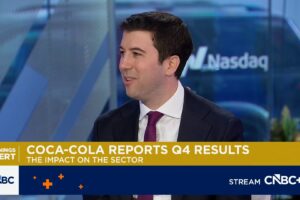<p class="canvas-atom canvas-text Mb(1.0em) Mb(0)–sm Mt(0.8em)–sm" type="text" content="Facebook (NASDAQ: FB) this week announced that it was forming a consortium to create a new, open-source cryptocurrency called Libra. The group includes payment companies like Visa, Mastercard, and PayPal, as well as tech companies like Uber, Lyft, and Spotify.” data-reactid=”11″>Facebook (NASDAQ: FB) this week announced that it was forming a consortium to create a new, open-source cryptocurrency called Libra. The group includes payment companies like Visa, Mastercard, and PayPal, as well as tech companies like Uber, Lyft, and Spotify.
Facebook won’t control the consortium, which could have as many as 100 members. Instead, it will be led by a nonprofit association in which all members will have an equal vote. The value of the Libra will be pinned to stable fiat currencies to reduce market volatility and speculation — two key issues that have hindered the wider adoption of cryptocurrencies as mediums with which to make ordinary payments. It plans to launch Libra in the first half of 2020.


Image source: Getty Images.
The consortium believes that making Libra a “global cryptocurrency” could solve payment issues for the 1.7 billion people worldwide who lack bank accounts. It also believes that Libra payments will be faster and cheaper than bank-to-bank fund transfers. Facebook won’t profit directly from the development of Libra, but it launched a new subsidiary, Calibra, to represent it in the consortium and develop a digital wallet for the currency.
<p class="canvas-atom canvas-text Mb(1.0em) Mb(0)–sm Mt(0.8em)–sm" type="text" content="Facebook's announcement wasn't particularly surprising since the company had been making moves in the cryptocurrency space since last year. However, it immediately triggered bipartisan calls for regulatory hearings in Congress and could push the company closer to an antitrust probe.” data-reactid=”26″>Facebook’s announcement wasn’t particularly surprising since the company had been making moves in the cryptocurrency space since last year. However, it immediately triggered bipartisan calls for regulatory hearings in Congress and could push the company closer to an antitrust probe.
What does Congress want?
U.S. Rep. Maxine Waters (D-California), who chairs the House Financial Services Committee, requested that Facebook “agree to a moratorium on any movement forward on developing a cryptocurrency until Congress and regulators have the opportunity to examine these issues and take action.”
The committee’s ranking Republican member, U.S. Rep. Patrick McHenry (R-North Carolina), expressed similar concerns. “We know there are many open questions as to the scope and scale of the project and how it will conform to our global financial regulatory framework,” he wrote. “It is incumbent upon us as policymakers to understand Project Libra. We need to go beyond the rumors and speculations and provide a forum to assess this project and its potential unprecedented impact on the global financial system.”
<p class="canvas-atom canvas-text Mb(1.0em) Mb(0)–sm Mt(0.8em)–sm" type="text" content="It's unclear if Facebook will agree to a hearing, but rejecting the request could spark an antitrust probe from the Federal Trade Commission. The FTC recently announced that it would oversee investigations into Facebook, but it hasn’t made any moves against the social networking giant yet.” data-reactid=”30″>It’s unclear if Facebook will agree to a hearing, but rejecting the request could spark an antitrust probe from the Federal Trade Commission. The FTC recently announced that it would oversee investigations into Facebook, but it hasn’t made any moves against the social networking giant yet.
What does Facebook want?
Facebook’s core platform serves 2.38 billion monthly active users and 1.56 billion daily active users worldwide. More than 2.1 billion people use at least one of its apps — Facebook, Instagram, WhatsApp, or Messenger — on a daily basis.


Image source: Getty Images.
Facebook generates 99% of its revenue from online ads. That business is highly sensitive to economic headwinds, and its use of targeted ads raises red flags with privacy and security experts. Therefore, the company needs to diversify into new markets.
Mobile payments and e-commerce services would fit naturally into its family of apps. Facebook has already taken a few steps into these markets, offering integrated payments in Messenger, WhatsApp, and Instagram; shoppable posts and in-app checkouts on Instagram; and live shopping videos on Facebook Live — but its footprint in those businesses remains relatively small.
Libra and Calibra could tie together Facebook’s thus-far fragmented efforts. It could give out free Libra coins to early adopters, offer them as loyalty points for buying products or even use them to pay users to view its ads. It could also sell ads at discounts to companies that pay with Libra, or offer rewards to merchants that accept the digital currency from customers.
<p class="canvas-atom canvas-text Mb(1.0em) Mb(0)–sm Mt(0.8em)–sm" type="text" content="The growth of that ecosystem could unite Facebook users across different countries, eliminate barriers to cross-border sales, and lower the barriers between its core apps. These efforts would help it lock in users in developing countries — which it's already trying to do with its internet-beaming drones and "zero-rated" apps (which don’t count toward a users’ mobile data caps).” data-reactid=”52″>The growth of that ecosystem could unite Facebook users across different countries, eliminate barriers to cross-border sales, and lower the barriers between its core apps. These efforts would help it lock in users in developing countries — which it’s already trying to do with its internet-beaming drones and “zero-rated” apps (which don’t count toward a users’ mobile data caps).
But will it spark an antitrust probe?
<p class="canvas-atom canvas-text Mb(1.0em) Mb(0)–sm Mt(0.8em)–sm" type="text" content="I recently stated that it could be tough for the FTC to build a case against Facebook for three reasons:” data-reactid=”54″>I recently stated that it could be tough for the FTC to build a case against Facebook for three reasons:
- It’s not the largest online ad platform in America;
- It still faces meaningful rivals in the social media space;
- It’s not employing unfair tactics (like undercutting rivals or subsidizing companies) to crush the competition.
Facebook’s attempt to launch a global currency raises concerns since nearly a third of the world’s population interacts with it every month. But Facebook could easily argue that it won’t own Libra, other companies plan to use it, and it will be an open-source cryptocurrency available to anyone. Even if Mark Zuckerberg does show up for a Congressional hearing about Libra, I doubt it will give the FTC enough ammo to launch an antitrust probe.
<p class="canvas-atom canvas-text Mb(1.0em) Mb(0)–sm Mt(0.8em)–sm" type="text" content=" More From The Motley Fool ” data-reactid=”60″> More From The Motley Fool
<p class="canvas-atom canvas-text Mb(1.0em) Mb(0)–sm Mt(0.8em)–sm" type="text" content="John Mackey, CEO of Whole Foods Market, an Amazon subsidiary, is a member of The Motley Fool’s board of directors. Randi Zuckerberg, a former director of market development and spokeswoman for Facebook and sister to its CEO, Mark Zuckerberg, is a member of The Motley Fool’s board of directors. Leo Sun owns shares of Amazon and Facebook. The Motley Fool owns shares of and recommends Amazon, Facebook, Mastercard, PayPal Holdings, and Visa. The Motley Fool recommends Uber Technologies. The Motley Fool has a disclosure policy.” data-reactid=”68″>John Mackey, CEO of Whole Foods Market, an Amazon subsidiary, is a member of The Motley Fool’s board of directors. Randi Zuckerberg, a former director of market development and spokeswoman for Facebook and sister to its CEO, Mark Zuckerberg, is a member of The Motley Fool’s board of directors. Leo Sun owns shares of Amazon and Facebook. The Motley Fool owns shares of and recommends Amazon, Facebook, Mastercard, PayPal Holdings, and Visa. The Motley Fool recommends Uber Technologies. The Motley Fool has a disclosure policy.










